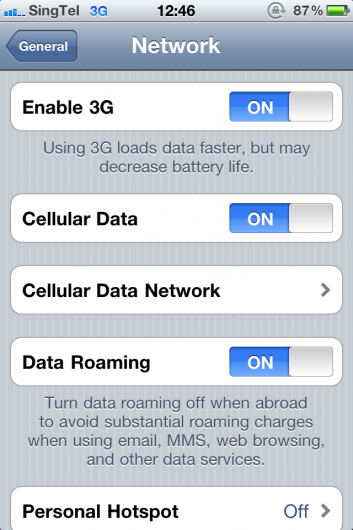
14 March 2011, Singapore – The Infocomm Development Authority of Singapore (IDA) today introduced new consumer protection measures for the mobile and broadband services.
Today’s announcement covers a few items which are expected to be implemented by first Quarter of 2012:
- Premium Rate Service (PRS)
- Data Roaming
- Reviewing of Quality of Service for Mobile Telephone Services
- Transparency of Internet Broadband Speeds
Premium Rate Service
I am glad that IDA has finally decided to step in so that consumers can prevent unwanted mobile charges caused by PRS and data roaming. PRS is a value-added service provided over any of the three telco networks via SMS on mobile phones which consists of the provision of content such as information, news, updates, quizzes, jokes, greeting messages, ringtones, wallpapers, logos and games for which charges are imposed over and above the standard network charges. In the future, consumers can opt for a PRS barring service to stop sending or receiving chargeable PRS offered by third-party providers in order not to be billed by them. This opt out service will be free when activated for the first time. Parents will no longer have to worry about their children’s participation in contests and getting charged for them.
With immediate effect, IDA will also impose more stringent penalties for contravention of the PRS Code, where errant PRS providers will face heavier financial penalties with repeat offenders having their licences suspended or cancelled. Where circumstances warrant, IDA will continue to exercise its right to suspend or cancel a PRS provider’s licence at any time.
Data Roaming
With the proliferation of smart phones, we often get bill shocks when we use data overseas. SingTel charges S$22 per MB of data during roaming unless you take up specific data roaming packages which ranges from S$20 per day for unlimited data roaming for the iPhone at Bridgeroam partner countries. To reduce the roaming bill shocks, mobile operators will be required to provide a free data roaming suspension option for consumers to limit their data roaming usage in a monthly billing cycle to S$100.
From 1 July 2011, telcos will be required to obtain explicit consent from their subscribers before providing any roaming services (including data roaming) which may be available by default ot mobile subscribers. Telcos will also be required to explicitly direct consumer to the prices, terms and conditions of the roaming services to ensure that consumers can make informed decisions.
Lastly, consumers will have the option of deactivating data roaming service prior to leaving Singapore. This can be reinstated when they are back in Singapore.
Reviewing Quality of Service for Mobile Telephone Services.
IDA has also launched a review of its Quality of Service (QoS) framework for 3G mobile telephone services with a view to raise the standards for mobile QoS indicators such as service coverage, success rate and drop call rate. This includes service coverage in outdoor areas, in-building areas, and road and MRT tunnels.
Transparency of Internet Broadband Speeds
Many consumers have fedback that actual speeds are often lower than the theoretical speeds advertised by broadband providers. In future, broadband service operators will have to publish the typical speeds that consumers can expect to experience.
Mr Leong Keng Thai, Director-General (Telecoms & Post) of IDA said, “There is a large number of smartphone users in Singapore nowadays. Many children also have their own mobile phones. Unfortunately, not all consumers are tech-savvy. These new measures serve to protect them from charges incurred by accessing PRS and data roaming services unknowingly, and will give them more control over their use of such services. IDA expects that these measures will also help to reduce mobile ‘bill shocks’ and time-consuming disputes over charges, thus benefitting consumers, mobile operators and PRS providers in the long run. However, notwithstanding these measures, consumers still have a part to play in exercising due care and diligence to understand the prices, terms and conditions of any service before they subscribe to it.”
Mr Leong added, “Information transparency is also an important prong of our regulations in safeguarding consumer interests. With clearer information on the Internet broadband access speeds, consumers can make informed choices when choosing their broadband plans.”
In summary, Mr Leong said, “As a whole, these new measures do not limit the operators’ flexibility to offer competitive and innovative services. On the contrary, these measures will help operators provide better services to their customers by helping their customers better understand the broadband plans offered in the market and manage their mobile phone bills. This in turn will help improve consumer satisfaction with the services provided by the operators.”




Pingback: IDA Introduces Consumer Protection Measures for Mobile and Broadband Services | TravelSquare